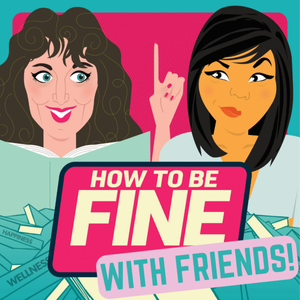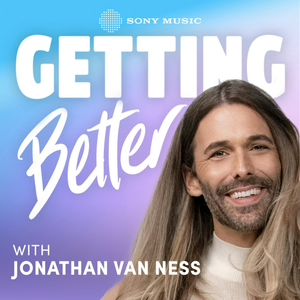
Quest Skinner Is Breaking Away the Emotional Blockade Between Artists and Buyers
09/01/21 • 37 min
1 Listener
Quest Skinner is an artist who is always striving to find new ways to make her artwork break away the emotional blockade between artists and buyers. As a mixed-media artist, teacher and community activist. Quest is influenced by the energy of cityscapes, music and the personalities she encounters every day. Then, in her studio, she brings them into her world; a world that takes raw feelings, vibrations and various moments in our lives then captures them with flowing pigments. Quest’s artwork tells a story that changes with every person who sees her work. Working with different traditional and non-traditional mediums, her fluid and always interchanging style of work keeps patrons coming back to explore the world through Quest’s eyes.
Read more about Quest Skinner.
Learn more about The Passionistas Project.
Full Transcript:
Passionistas: Hi and welcome to the Passionistas Project Podcast, where we talk with women who are following their passions to inspire you to do the same.
We’re Amy and Nancy Harrington and today we’re talking with Quest Skinner, an artist who is always striving to find new ways to make her artwork break away the emotional blockade between artists and buyers. As a mixed-media artist, teacher and community activist. Quest is influenced by the energy of cityscapes, music and the personalities she encounters every day. Then, in her studio, she brings them into her world; a world that takes raw feelings, vibrations and various moments in our lives then captures them with flowing pigments. Quest’s artwork tells a story that changes with every person who sees her work.
Working with different traditional and non-traditional mediums, her fluid and always interchanging style of work keeps patrons coming back to explore the world through Quest’s eyes.
So please welcome to the show, Quest Skinner.
Quest: Thank you guys for having me.
Passionistas: What's the one thing you're most passionate about?
Quest: I think as I get older, staying honest and true to self. Over the years, you know, we compromise just a little and sometimes it really will take one moment and make it eternal. I just want to make sure that I stay true to self and vibe and keep my, my spirit in life and love.
It's so easy to get knocked off of your posts when things aren't always, or don't appear to be what you want or aren't in focus in that moment. So staying focused.
Passionistas: Let's take a step back. Tell us a little bit about where you grew up and your childhood. And, um, in particular, where did your name come from?
Quest: Childhood is one of those sensitive issues with me. I think like anybody who really creates and put your heart in your blood and your mind into it, it's got to come out of something. And I look at my childhood coming out of Pittsburgh, a little like a coal miner's daughter. I was, I learned how to sew. I learned how to hunt.
I learned how to fish. I learned how to live organic and be a part of everything around me. And then I also learned we're fine. And I learned how to dress and walk the part and go to Bible school. And you know, this, I went to Colfax Elementary School, so a little Jewish elementary school, and I learned the world from being in a microcosm that was so filled with culture.
The one thing I can say is those mountain cities, like the one that I moved to now, Seattle, they're filled with so much art, so much culture vibing communities that in the worst of times, really make the most intricate and extreme and brilliant thought process manifest out of nothing. So, yeah, Pittsburgh, that was part of it.
And then about 16. And after my 16th birthday, my mother kind of packed me up and said, we're moving Arizona. And I went from mountains to Val. And it was very amazing. I got really interconnected with, um, one of my cousins and she's just a spirit of fire and life and by vivacious. And here we both are at 43 and we are alive.
I think it all comes from being, being in, in extreme different environments and not really knowing what I was getting into, but being a part of that environment made emoted and really created this like international, global little phenomenon spirit. It was everybody to go a little bit deeper into it.
How did I even get my name? I was in high school and I had to write a paper. It was like one of those graduating papers, you know, blah, blah, blah, blah. And I remember choosing to write it about two sisters, one Simplicity, and the other one was Quest. And Simplicity was everything that a parent would want, calm, chill, responsible, this, that, and a third. And Quest was everything that everybody should want to be — free, expressive, full of love, sexy, but not sexual, sensual, but not offensive like me. And I realized in that ...
Quest Skinner is an artist who is always striving to find new ways to make her artwork break away the emotional blockade between artists and buyers. As a mixed-media artist, teacher and community activist. Quest is influenced by the energy of cityscapes, music and the personalities she encounters every day. Then, in her studio, she brings them into her world; a world that takes raw feelings, vibrations and various moments in our lives then captures them with flowing pigments. Quest’s artwork tells a story that changes with every person who sees her work. Working with different traditional and non-traditional mediums, her fluid and always interchanging style of work keeps patrons coming back to explore the world through Quest’s eyes.
Read more about Quest Skinner.
Learn more about The Passionistas Project.
Full Transcript:
Passionistas: Hi and welcome to the Passionistas Project Podcast, where we talk with women who are following their passions to inspire you to do the same.
We’re Amy and Nancy Harrington and today we’re talking with Quest Skinner, an artist who is always striving to find new ways to make her artwork break away the emotional blockade between artists and buyers. As a mixed-media artist, teacher and community activist. Quest is influenced by the energy of cityscapes, music and the personalities she encounters every day. Then, in her studio, she brings them into her world; a world that takes raw feelings, vibrations and various moments in our lives then captures them with flowing pigments. Quest’s artwork tells a story that changes with every person who sees her work.
Working with different traditional and non-traditional mediums, her fluid and always interchanging style of work keeps patrons coming back to explore the world through Quest’s eyes.
So please welcome to the show, Quest Skinner.
Quest: Thank you guys for having me.
Passionistas: What's the one thing you're most passionate about?
Quest: I think as I get older, staying honest and true to self. Over the years, you know, we compromise just a little and sometimes it really will take one moment and make it eternal. I just want to make sure that I stay true to self and vibe and keep my, my spirit in life and love.
It's so easy to get knocked off of your posts when things aren't always, or don't appear to be what you want or aren't in focus in that moment. So staying focused.
Passionistas: Let's take a step back. Tell us a little bit about where you grew up and your childhood. And, um, in particular, where did your name come from?
Quest: Childhood is one of those sensitive issues with me. I think like anybody who really creates and put your heart in your blood and your mind into it, it's got to come out of something. And I look at my childhood coming out of Pittsburgh, a little like a coal miner's daughter. I was, I learned how to sew. I learned how to hunt.
I learned how to fish. I learned how to live organic and be a part of everything around me. And then I also learned we're fine. And I learned how to dress and walk the part and go to Bible school. And you know, this, I went to Colfax Elementary School, so a little Jewish elementary school, and I learned the world from being in a microcosm that was so filled with culture.
The one thing I can say is those mountain cities, like the one that I moved to now, Seattle, they're filled with so much art, so much culture vibing communities that in the worst of times, really make the most intricate and extreme and brilliant thought process manifest out of nothing. So, yeah, Pittsburgh, that was part of it.
And then about 16. And after my 16th birthday, my mother kind of packed me up and said, we're moving Arizona. And I went from mountains to Val. And it was very amazing. I got really interconnected with, um, one of my cousins and she's just a spirit of fire and life and by vivacious. And here we both are at 43 and we are alive.
I think it all comes from being, being in, in extreme different environments and not really knowing what I was getting into, but being a part of that environment made emoted and really created this like international, global little phenomenon spirit. It was everybody to go a little bit deeper into it.
How did I even get my name? I was in high school and I had to write a paper. It was like one of those graduating papers, you know, blah, blah, blah, blah. And I remember choosing to write it about two sisters, one Simplicity, and the other one was Quest. And Simplicity was everything that a parent would want, calm, chill, responsible, this, that, and a third. And Quest was everything that everybody should want to be — free, expressive, full of love, sexy, but not sexual, sensual, but not offensive like me. And I realized in that ...
Previous Episode

BONUS: Katie Chin on cooking at The White House
Katie Chin on cooking at The White House.
More from Katie:
BONUS: Katie Chin on doing live cooking segments on television
BONUS: Katie Chin on her work with the National Pediatric Cancer Society
BONUS: Katie Chin on what she hopes people take away from her cookbooks
Hear Katie's full episode.
Read more about Katie Chin.
Learn more about The Passionistas Project.
Next Episode

Lynn Harris Is Bringing the Power of Comedy to Women and Non-Binary People
Lynn Harris is the CEO and founder of GOLD Comedy — the online comedy world for young women and non-binary folks who want to nerd out about comedy together. Lynn is also a creative partner to select brands, organizations and individuals, blending her experience in writing, communications, advocacy and entertainment to create strategic content that brings maximum fun to serious issues, for maximum impact.
Read more about Lynn Harris.
Learn more about The Passionistas Project.
Full Transcript:
Passionistas: Hi, and welcome to the Passionistas Project podcast, where we talk with women who are following their passions to inspire you to do the same. We're Amy and Nancy Harrington. And today we're talking with Lynn Harris, the CEO and founder of Gold Comedy, the online comedy worlds for young women and nonbinary folks who want to nerd out about comedy together, but is also a creative partner to select brands, organizations, and industry.
Blending her experience in writing communications, advocacy, and entertainment to create strategic content that brings maximum fun to serious issues for maximum impact. So please welcome to the show. Lynn Harris.
Lynn: Thank you.
Passionistas: What's the one thing you're most passionate about?
Lynn: Besides salt? I'm into salt and I'm into comedy is power. I'm passionate about a lot of things. I'm passionate about a lot of things. I think the most on-brand thing for me to say right now is comedy is power and comedy, as I'm passionate about comedy as power. And that's why it matters to me. Who's got the mic so to speak.
Passionistas: So what does that mean? What, what does comedy as power mean and why is it so important who has the mic?
Lynn: It's certainly at an individual level and to the cultural level. When you make people laugh, you make people listen. And comedy really has been, as you know, at this sort of level of joke and at the level of industry and at the level of culture has really been defined by a kind of a small narrow group of people since the beginning, which is.
Because if you think about it, comedy, everyone thinks of comedy as this outsider, art that you get into comedy. Cause like the underdog and you're punching up at power. And why are white dudes running the whole thing? It makes no sense. I'm working to try to change that. How are you changing? The more women do comedy.
The more women define comedy. And that's true, not just for women, but for anybody who is not a straight white dude, many of whom are very funny, but I think that comedy will be funnier if it is defined by more types of voices. And if comedy is funnier, the world's a better place, honestly. Not just because laughter is the best medicine, which it's like the second best the COVID vaccine is the best, but also because comedy affirms connections.
When you laugh at a joke, that means you get the joke. And when you get the joke, that means you're in on something you like, you got the reference, you follow the comic on there. On their bait and switch. And a lot of people say that, you know, that's, that's the reason that comedy brings people together.
I'm not super convinced that it does because for better and for worse, I think it's sort of affirms who we are. Not that it doesn't have something to teach us, which I can circle back to, but I think, you know, comedy does affirm who we are and what we think is funny and, uh, what we think is important. And it can also change that to some degree it can, um, cause as comedy, you know, comedy kind of is sort of a fun house mirror for color.
And what we're allowed to laugh at can change for better and for worse, usually for better the arc of a let's see, how can I destroy that? Quote, the, you know, the arc of, of comedy? What is it? They have bends toward justice, right? As things become okay to say not okay to say, I think that's a, both a driver and a reflection of culture evolving, and that's why it's important to have. For a lot of us to be in charge of how that culture is evolving.
Passionistas: So let's take this back. Tell us a little bit about your childhood and when was the first time you remember that you were funny?
Lynn: Okay. This is so dumb, but I remember I was, I don't know, six, seven, I don't know. And my mother was kind of the kind of person who, like, if you sneezed, she would be like, what's wrong.
And I remember I was little five or six whenever and she said, Are you and she heard me cough, or like I said something, I don't know what, and she said, are you okay? You're a little horse. And I said, no, I'm not. I'm a little, child's obviously my parents thought that was side splitting and I got a big laugh and I was like, oh, I can let them getting last as fun.
That's the first one. I...
If you like this episode you’ll love
Episode Comments
Featured in these lists
Generate a badge
Get a badge for your website that links back to this episode
<a href="https://goodpods.com/podcasts/the-passionistas-project-podcast-133608/quest-skinner-is-breaking-away-the-emotional-blockade-between-artists-16416277"> <img src="https://storage.googleapis.com/goodpods-images-bucket/badges/generic-badge-1.svg" alt="listen to quest skinner is breaking away the emotional blockade between artists and buyers on goodpods" style="width: 225px" /> </a>
Copy





